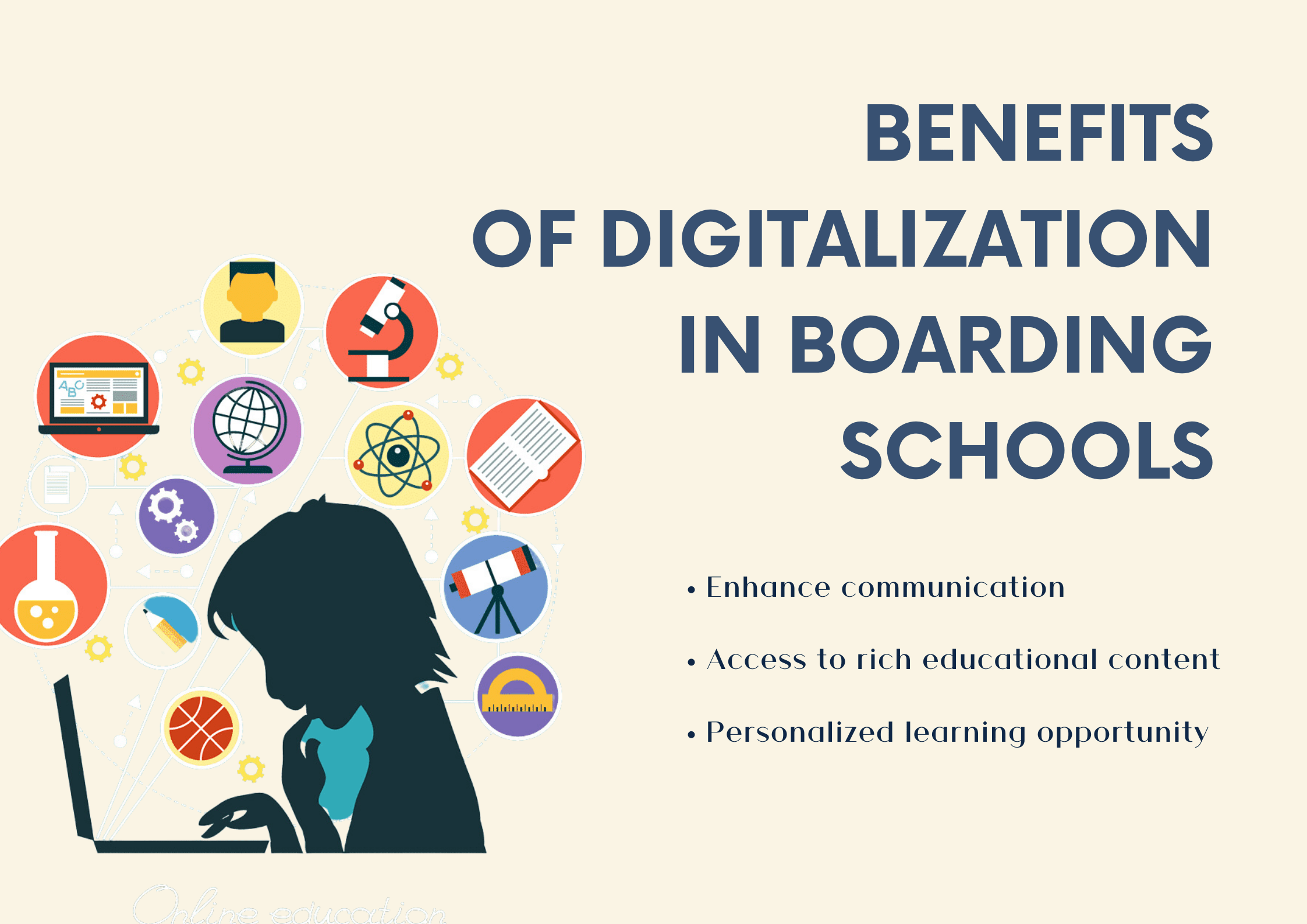Digitalization has revolutionized education in numerous ways, and its impact extends to boarding schools as well. By integrating digital technologies, boarding schools can unlock a range of benefits that enhance the educational experience and the overall efficiency of the institution.
From streamlined administrative processes to improved communication and access to resources, digitalization plays a crucial role in shaping the future of boarding schools. This blog explores the key benefits of digitalization in boarding schools, highlighting the positive impact it has on students, teachers, and the institution as a whole.
Key benefits of digitalization in boarding schools are as follow :
Streamlined Administrative Processes

One of the primary benefits of digitalization in boarding schools is the streamlining of administrative processes. By replacing traditional paper-based tasks with digital workflows, schools can save time and resources while increasing efficiency. Digital platforms and management systems enable seamless data management, allowing staff to access and update student records with ease.
This shift eliminates the need for extensive physical filing systems and provides secure storage and easy retrieval of important documents. With streamlined administrative processes, staff can devote more time and energy to strategic tasks such as student support and curriculum development.
Enhanced Communication and Collaboration

Digital tools facilitate seamless communication and collaboration among students, teachers, parents, and administrators. Online platforms, such as learning management systems (LMS) and communication apps, serve as centralized hubs for sharing information, assignments, announcements, and grades. Real-time messaging and video conferencing tools enable instant communication between stakeholders, promoting effective collaboration and timely feedback.
These digital communication channels also foster strong parent-school partnerships, allowing parents to stay informed about their child’s progress and engage in ongoing conversations with teachers. Improved communication and collaboration create a supportive learning environment that benefits students.
Access to Rich Educational Resources

Digitalization opens up a world of educational resources beyond traditional textbooks. Online libraries, e-books, educational websites, and multimedia content provide a wealth of information and interactive materials that enhance the learning experience.
Digital platforms empower teachers to curate and share resources, ensuring students have access to relevant and up-to-date materials. This diverse range of resources caters to different learning styles and encourages independent exploration. Students can engage with interactive simulations, videos, and educational games, making learning more dynamic and engaging.
Personalized Learning Opportunities

Benefits of digitalization includes personalized learning, allowing students to progress at their own pace and explore topics of interest. Adaptive learning platforms, powered by artificial intelligence (AI), analyze student performance and provide targeted recommendations, adapting the content to individual needs.
These platforms offer personalized feedback, customized learning materials, and adaptive assessments. With digital tools for personalized learning, boarding schools can meet the unique needs of each student, fostering an inclusive and effective educational environment. Personalized learning enhances student engagement, comprehension, and academic achievement.
Blended Learning and Remote Education

Benefits of digitalization facilitates the implementation of blended learning models that combine online and in-person instruction. This flexibility is particularly advantageous for boarding schools, as it allows students to access educational content and resources even during holidays or when they are away from the campus.
In situations such as pandemics or travel restrictions, digital tools enable a seamless transition to remote education, ensuring continuity of learning without disruption. Online classes, interactive assignments, and virtual discussions enable students to engage with the curriculum regardless of their physical location.
Data-Driven Decision-Making:

Benefits of digitalization includes , provides valuable data insights that support data-driven decision-making at the institutional level. Analytics and reporting tools help administrators and teachers track student progress, identify areas of improvement, and assess the effectiveness of teaching strategies.
By analyzing student data, boarding schools can identify patterns, trends, and areas where additional support may be required. These data-driven insights enable evidence-based initiatives to enhance student outcomes and institutional performance.
Data-driven decision-making helps schools identify and address learning gaps, tailor instructional approaches, and create targeted interventions to support student success.
Conclusion
The benefits of digitalization in boarding schools are transformative. By streamlining administrative processes, enhancing communication and collaboration, providing access to rich educational resources, supporting personalized learning, facilitating blended learning and remote education, and enabling data-driven decision-making, benefits of digitalization empowers boarding schools to create a dynamic and inclusive learning environment.
Through the integration of digital technologies, boarding schools can prepare students for the digital age and equip them with the skills necessary for future success. By embracing digitalization, boarding schools can harness their full potential and offer an educational experience that meets the needs of the modern learner.







